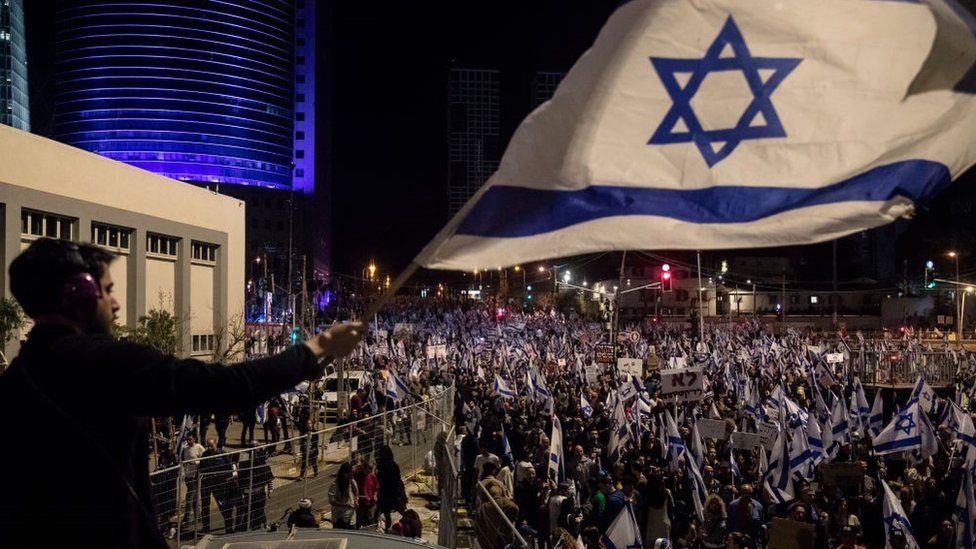Prime Minister Benjamin Netanyahu says the changes – that would curb the power of courts – will restore balance between the branches of government. Opponents say they threaten democracy.
At one of Saturday’s rallies, opposition leader Yair Lapid said this was Israel’s “greatest crisis”.
In a separate development, Israeli troops shot dead three armed Palestinians near the West Bank city of Nablus on Sunday, the Israeli army said. It said the gunmen had fired at an Israeli army post.
Palestinian officials have not commented on the incident. There has been a marked surge in violence between Palestinians and Israel in recent months.
On Saturday, protest organisers said as many as 500,000 demonstrators took to the streets across Israel, in what the Haaretz newspaper called “the largest demonstration in the country’s history”.
About 200,000 people turned up in Tel Aviv, many carrying Israel’s national flag.
Tamir Guytsabry, who marched in the city, told Reuters: “It’s not a judicial reform. It’s a revolution that [is] making Israel go to full dictatorship and I want Israel to stay a democracy for my kids.”
Protesters applauded police chief Amichai Eshed as he walked through the rally. Mr Netanyahu’s government had earlier sought to remove the district commander – but the move was blocked by the country’s attorney general.
On Saturday, a record crowd of 50,000 marched in the northern city of Haifa, in what was the 10th consecutive week of nationwide protests against the government plans.
Speaking in the southern city of Be’er Sheva, Mr Lapid warned that the country was facing an unprecedented crisis. “A wave of terrorism is hitting us, our economy is crashing, money is escaping the country. Iran just signed yesterday a new agreement with Saudi Arabia. But the only thing this government cares about is crushing Israeli democracy,” he said.

The reforms aim to give the elected government decisive influence over the choice of judges, and limit the ability of the Supreme Court to rule against the executive or strike down legislation.
The issue has caused deep divides in Israeli society and, significantly, has seen reservists – the backbone of Israel’s military – threatening to refuse to serve as a way of showing their opposition.
Last Monday, in an unprecedented move, dozens of reserve fighter pilots in an elite Israeli Air Force squadron said they would not report for training. They later reversed course and agreed to attend and hold talks with their commanders.
On Thursday, protesters blocked roads and attempted to stop Mr Netanyahu flying out of the country. He later took off for Rome. The government has stood firm in the face of the uproar, claiming the protests are being fuelled by political opponents.
Critics say the planned reforms, which are already making their way through parliament, will politicise the judiciary and could lead to an authoritarian government.
Mr Netanyahu says the reforms are designed to stop the courts overreaching their powers and that they were voted for by the Israeli public at the last election.















































